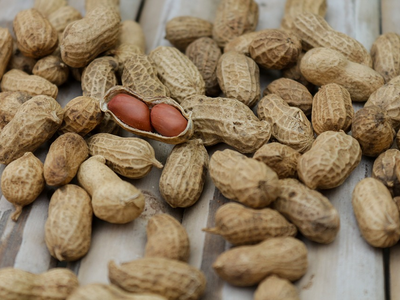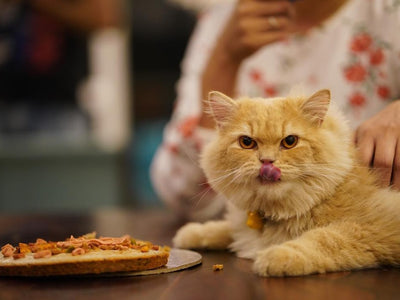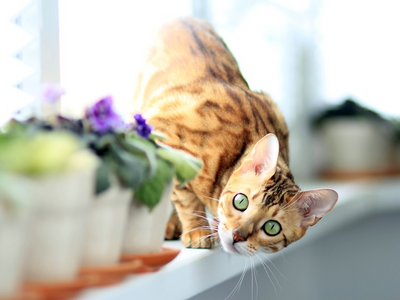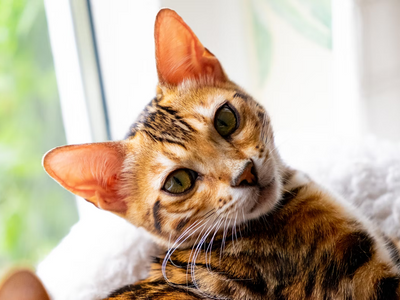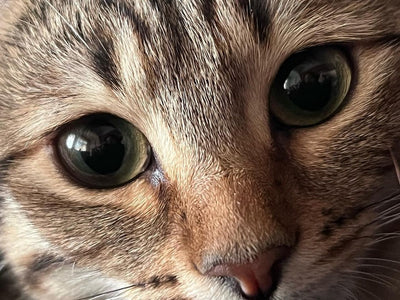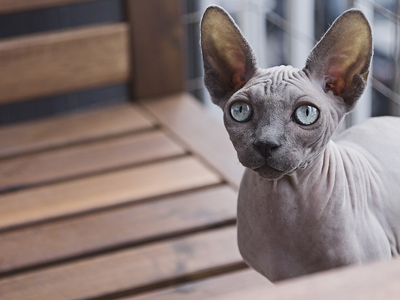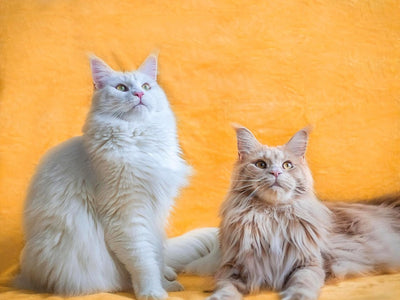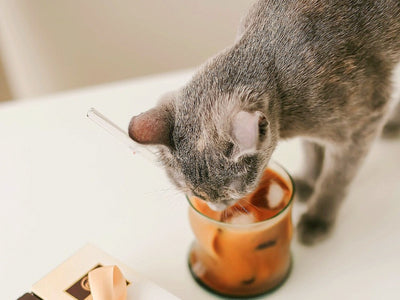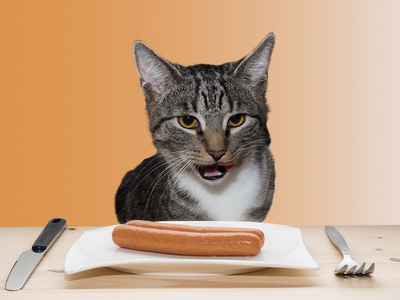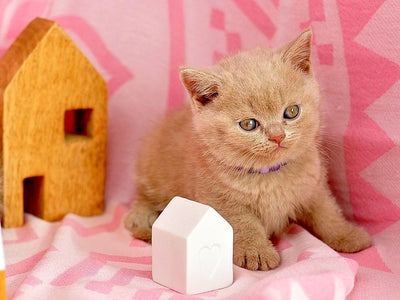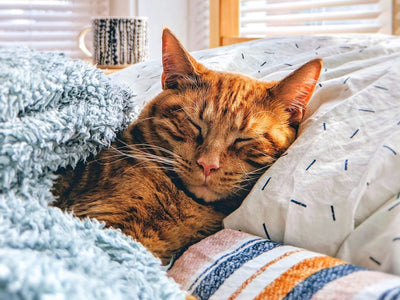04.10.2021
Can cats eat cheese? The gouda, the bad, and the ugly of this dairy treat
Sweet dreams are made of cheese—or are they? If you ever made some grilled cheese or whipped up a charcuterie board, you probably noticed your furry friend sneaking around and waiting for you to drop a piece of dairy deliciousness.
Over the years, you must have come across hundreds of pictures of cats happily slurping on milk, so the idea of cats eating cheese comes across as perfectly fine, right? Can cats eat cheese, though? Just because you saw Garfield devour lasagna on TV, it doesn't necessarily mean that cheese is good for your cat—on the contrary, it might even be one of the foods cats shouldn’t eat.
Did you catch your sneaky furry friend munching on this dairy treat? Find out if cats can eat cheese and whether you should be concerned if they do!

Mooooom, did you leave food out for too long again? This smells funky!
Source: Freepik
To brie or not to brie? Should cats eat cheese?
Cats are obligate carnivores, which means their digestive system processes meat perfectly but struggles with other animal products, including milk and cheese. Dairy products are animal-based products and contain protein, but not the kind cats need. They require protein that comes from meat. Cheese isn’t exactly nutritionally suitable for a feline diet, but could it be bad for cats? The answer is—yes, and here’s why.
Why is cheese bad for cats?
The science behind felines struggling with dairy is that a cat’s body does not produce enough enzymes (lactase) to digest the sugar in milk and milk-based products—also known as lactose. If cats produced lactase, the enzyme would break down lactose into glucose and galactose, which a feline body can absorb. This hard-to-digest sugar isn’t the only reason why you should avoid treating your kitty to a bit of cheese, though.
Lactose problems aside, cheese is high in fat and calories, which means even tiny treats could cause your kitty to gain weight. Did you know that:
- As little as 100 grams of brie would surpass the recommended caloric intake for an average-sized cat by ⅓?
- ⅔ of the energy value of cheese comes from milk fat?

Well, well, what do we have here?
Source: Felix Wolf
How caloric is cheese compared to a feline diet?
Check out some of the most popular kinds of cheese and their caloric value compared to the recommended daily intake for 3–4 kilo neutered cat:
|
Cheese |
Calories in 50 grams of product (a typical sandwich portion) |
% of an average cat’s recommended caloric intake (220 calories) |
|
Cheddar |
200 |
90% |
|
Cream cheese |
170 |
77% |
|
Cottage cheese |
50 |
23% |
|
Goat cheese |
180 |
82% |
|
Blue cheese |
180 |
82% |
|
Parmesan |
215 |
98% |
|
Mozzarella |
140 |
64% |
|
Gouda |
180 |
82% |
|
Swiss cheese |
190 |
86% |
|
Emmental |
185 |
84% |
Can kittens eat cheese?
Kittens produce lactase during their first eight weeks of life so that they can digest their mother’s milk. During that period, technically speaking, kittens can eat cheese but lack the teeth to munch on harder kinds. Creamier types of cheese often have higher sodium levels, so while kittens can digest the lactose in cheese, the salt might cause toxicosis.
Once kittens begin weaning, lactase production reduces gradually, making the kittens more and more intolerant to lactose over time.
How do different types of cheese impact cats?
The fact that cheese has its separate store aisle speaks volumes about how many different types of this dairy treat exist. Of course, not all kinds of cheese are the same, and they mainly differ by:
- Sodium levels
- Moisture content
- Fat content
Let’s take a closer look at some particular kinds of cheese and what happens if your furry friend eats them. Some of the most popular types of cheese are:
- Parmesan
- Cream cheese
- Blue cheese
Can cats eat parmesan cheese?
You must have seasoned at least one dish in your life with parmesan, but is it a trick or a treat to your kitty? Parmesan is low in lactose, so if your kitty treated themselves to a piece you dropped, they should be okay.
Can cats eat cream cheese?
Cream cheese is fantastic as a dip or spread, but is it good in combination with cat food? Although it is low in lactose and salt and one of the safer options for your kitty to ingest, cream cheese has a high caloric value (around 350 kcal per 100g) and isn’t fitting for a healthy feline diet.
Can cats eat blue cheese?
Your kitty’s tummy might not be so forgiving to blue cheese. The mould in blue cheese can upset your cat’s digestion, especially if your kitty is in the senior category. Some other types of cheese you should avoid are:
- Feta—If you ever had a taste of feta, you know how salty it is. Other than a high sodium content, feta is packed with saturated fats, too
- Goat cheese—Despite being marketed as a healthy option, goat cheese is too high in salt and calories and inadequate for your cat’s diet
- Cottage cheese—This type of cheese is too high in lactose to be included in your kitty’s nutrition
What about plant-based cheese?
Vegan cheese might seem like a way around the lactose problem. Unfortunately, this type of cheese is typically more processed, causing it to contain more sodium and be less nutritional than traditional cheese. High amounts of sodium are poisonous to cats.
Cat milk cheese—say what now?
Some people milk cats to make cheese. Yes, you read that right—cat milk cheese. Since it comes from a cat, it must be safe for cats to eat, right? Unfortunately, only kittens can digest lactose from a queen’s milk, while adult kitties can have the same issues they face when eating traditional kinds of cheese.
People say it’s delicious, though, and that the taste of cat milk cheese depends on the breed that's milked.

Did you hear this, ma? They’re milking cats now!
Source: Arina Krasnikova
Do cats eat cheese by themselves?
Cats who are familiar with cheese will be tempted to munch on any unsupervised dairy treats. Whether your cat is in the cheese-lover category or unfamiliar with the food, a good practice would be to keep all dairy products in airtight containers or in places your cat can’t reach. It’s also not uncommon for cats to continue eating foods they like, even if it causes them discomfort.
My cat ate cheese. Should I be worried?
In most cases, a tiny cube of cheese won’t cause any trouble, but don’t be surprised if your kitty starts acting strange as most cats experience dairy allergies or intolerance. Some of the signs that dairy is causing a stir in your kitty’s tummy are:
- Bloating
- Vomiting
- Diarrhoea
- Excessive gas
- Constipation
- Tummy ache
- Itchy skin
- Excessive skin licking
What causes dairy allergies?
Vets and feline specialists speculate about the cause of dairy allergies, but they assume that your cat could have:
- An intolerance to casein—a protein that is present in mammalian milk and can be found in all dairy products
- A too sensitive stomach and digestive tract
- An overreactive immune system
Do I need to take my cat to the vet if they eat cheese?
A small amount of cheese might cause some of the mentioned symptoms but isn’t life-threatening. While cheese isn’t toxic, you should take your kitty to the vet if:
- The symptoms worsen
- You know your cat is allergic to dairy (casein)
- You’re unsure about the amount of cheese your kitty ate
What can the vet do if you suspect that your cat is allergic to dairy?
If you take your kitty to the vet’s office for a potential dairy allergy, the vet will ask you about:
- The symptoms (their severity and when they started)
- The dairy product that you suspect your cat ingested
- Any other potential allergens your cat was exposed to
To find out whether a dairy allergy caused the symptoms, the vet will perform some tests, such as:
- A complete physical examination
- Urinalysis
- Bloodwork
- A biochemistry profile
Depending on the test results, the vet will recommend an appropriate treatment. If your cat does suffer from dairy allergies, you will receive a diet you need to follow strictly for a certain period. You will also have to report to your vet regularly about any changes in symptoms and your cat’s state.
After concluding which foods are not allergens, the vet will notify you about the ingredients you can reintroduce to your cat’s diet.
Ingredients found in cheese that might not benefit your kitty
Cheese often comes with various additional ingredients and spices that can further upset your kitty’s sensitive stomach. Milk, as the main ingredient in cheese production, is a no-go as well, but there are plenty more foods that are dangerous to cats. Those include:
|
Food |
Consequences of ingestion |
|
|
|
Nuts, such as:
|
|
|
Salt (in large amounts) |
|
|
Mushrooms |
|
|
Spicy foods, such as:
|
|
Other foods your cat should steer clear of
Cheese is not the only troublemaker. Many other foods we eat daily can cause our furry friends health problems. Some of the foods that pose the most significant danger to your cat are:
|
Food |
Health problems it causes |
|
Alcohol |
|
|
Raw bread dough containing yeast |
Stomach bloating and twisting |
|
Citrus fruits |
|
|
Coffee and chocolate (due to caffeine and theobromine) |
|
|
Coconut flesh and water |
Digestive problems |
|
Grapes and raisins |
Urinary problems and potential kidney failure |
|
Xylitol (sweetener in sugar-free foods) |
|
|
Fat trimmings |
|
|
Small, raw bones |
Damage to the oesophagus and stomach |
|
Seeds and skin of cherries, plums, apples, and pears |
Respiratory issues and shock |
Raw chicken and other uncooked meats might not necessarily be bad for your kitty, but they can carry various bacteria you wouldn’t want your feline to contract, such as salmonella and E. coli. Always consult your vet before putting your cat on a raw diet.
Check out our other guides to what cats can or cannot eat:
|
|
What does the ideal cat diet contain?
A healthy feline diet consists of the purrfect amount of:
|
Nutrients |
Foods that contain them |
|
|
What happens if your cat’s diet isn’t up to par?
If your cat’s diet isn’t nutritious enough or they suffer from nutrient malabsorption, they will experience these symptoms:
- Changes in the coat, such as severe shedding, faded colour, and rougher feel
- Drooling
- Vomiting
- Seizures
- Lethargy
- Anorexia
If you suspect that your cat has a nutrient deficiency, you can add some supplements to their diet after consulting your vet. If you feed your cat a high-quality diet, though, you’ll never have to worry about a lack of nutrients.
How to choose awesome (or should we say, clawsome) food for your furry friend
Do you get overwhelmed by all the available options when you go shopping for cat food? Here are some pointers, so you know exactly what you’re looking for:
- Transparent ingredient lists (without terms like meat derivatives, meat meals, and similar)
- High meat contents (less fillers like grains and vegetable proteins)
- No sugars
- High moisture contents
Treat your cat to Untamed
Many high-quality diet options on the market are often not tasty enough to satisfy our furry friends’ delicate palates. Our mission is to deliver delicious and nutritious meals to keep your kitty healthy and happy!
We hope we’re not cheesy when we say our pack loves us, and for a good reason! Our human-grade whole-meat recipes are more than a delicious treat! Some of the benefits people report after switching their cats to Untamed include:
- Softer and shinier coat
- Regular and less uncomfortable potty habits
- Fewer hairballs
- Much more energy
- Extra cuddles for being an amazing cat parent!
Let your kitty try our food—sign up now to order your trial pack!
Our yummies work for sensitive tummies, too!
With our vet-formulated hypoallergenic formulas, you can kiss both airborne and cat food allergies goodbye! Our production process ensures that all the natural flavours and nutrients stay in place while making sure that the proteins don’t harm your sensitive feline! Our products are free from tummy-wrecking ingredients like artificial flavour enhancers and harsh preservatives. In addition, no dairy products come in contact with our ingredients, so you don’t have to worry about a potential reaction.
We care for your cat, and we want to get to know them to make sure we send the purrfect meal pack to your doorstep.
Untamed—a meal pack designed for your cat
We believe that all cats are extraordinary individuals with their own pawticular sets of needs, and we strive to meet them. We will design special meal packs based on your cat’s:
- Taste preferences
- Food sensitivities
- Potential allergies
- Life stage
Do you want to give your kitty a royal treatment tailored to their preferences? If so, follow these steps:
- Open our Try Now page
- Complete our brief questionnaire so we can learn about your furry friend
- Review the meal plan and place the order
The goods will be delivered to you in no time—we offer free cat food shipping for online orders. If your kitty gives us a paws up, we will replenish their Untamed cans regularly.
Our fresh cat food delivery service is always super flexible—you can pause or cancel an order anytime!
We use recyclable packaging only, and our carbon footprint stays neutral across our deliveries.
Pawsome alternatives to cheese
Is your kitty feeling blue because you denied them some cheese? Don’t worry—there are plenty of other treats you can serve to your furry friend (although in moderation), such as:
- Fruits (specific sorts)
- Veggies (specific sorts)
- Grain (specific sorts)
- Lean cold cuts
- Canned fish
Cats prefer meat-based snacks to meat-free ones. Remember that fruits, veggies, and grains are not a part of a cat’s natural carnivorous diet. They can work as occasional snacks, but will never satiate your cat or provide the nutritional value they need.
Fruit snacks for happy cats
Here are some fruits that cats can nibble on from time to time:
- Berries, such as:
- Blueberries
- Blackberries
- Strawberries
- Raspberries
- Apples (without the skin, seeds, or stem)
- Bananas
- Seedless watermelon
Make sure to keep the servings bit-sized to prevent accidental choking.
Veggies your kitty can munch on
Not all kitties are fond of veggies, but those that are usually opt for:
- Carrots
- Peas
- Corn
- Broccoli
- Spinach
- Lettuce
- Zucchini
- Cucumber (if your kitty doesn’t mistake it for a snake, as some do)
The cellulose content in raw veggies is indigestible to cats, so be mindful about that.
Before serving veggies, chop them into tiny pieces and steam them so they become easier for your feline to munch on.
Cats can snack on grains, but you need to be careful!
Here are some grainy snacks you can share with your feline:
- Corn
- Millet
- Barley
- Polenta
- Couscous
- Brown rice
- Wheat berries
Since cats are not biologically predisposed to digest grains, especially those with a coarse texture, never serve more than a spoonful of grains as munchies. An overdose of grains adds too much fibre to a cat’s diet, which leads to malabsorption of other nutrients.
Also, be aware that certain grains, like corn, can trigger severe food allergies in cats.
Lean cold cuts that make a kitty go nuts
Lean deli meat is a pawsome nutritional treat that can help you add a little extra protein to your cat’s diet. Cold cuts that are not only safe but also beneficial for your kitty’s health include:
- Turkey
- Roast beef
- Chicken
If your kitty loves deli meats, they will go wild for our Chocka Chicken with Ham in Gravy!

Chocka Chicken with Ham—a paw-licking treat for every gourmet cat!
Image (c) Untamed
Treat your cat to some canned fish
Fish is an excellent source of protein and fatty acids, and you can bet your cat will be happy to nibble on some:
- Mackerel
- Sardines
- Tuna
Our recipes, Tuck-in Tuna and Full on Fishy, are the perfect treats for a fish-loving kitty because they don’t include any unpleasant extras (like vegetable derivatives) but feature only the most delicate fish cuts instead! If you’re looking for a gourmet treat, our fishy recipes come in a jelly and gravy formula, so your fussy eater can choose which one they like best!
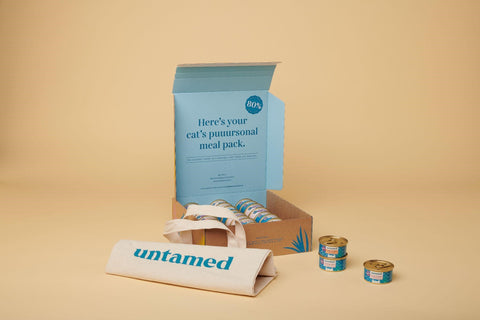
Mom, this is the best food you ever ordered, totes!
Image (c) Untamed

![Associated image for What human food can Sphynx cats eat? [Comprehensive list]](http://untamed.com/cdn/shop/articles/what_human_food_can_sphynx_cats_eat_Featured_400x300_crop_center.jpg?v=1648705074)
